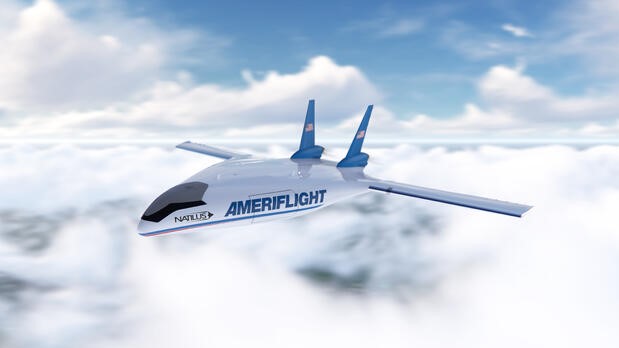Ameriflight to buy 20 Natilus cargo aircraft

US cargo airline Ameriflight has placed an order for 20 Natilus Kona autonomous feeder cargo aircraft valued at $134m.
Ameriflight has become the first regional US carrier to sign an Aircraft Purchase Agreement with Natilus.
The agreement brings total commitments for Natilus aircraft to $6.8bn – for delivery of 460+ aircraft.
Other orders are from companies including Volatus Aerospace, Astral Aviation, Aurora, Dymond and Flexport.
Ameriflight is the largest Part 135 cargo airline in the US, serving 200 destinations throughout the US, Canada, Mexico, the Caribbean and South America.
The airline’s primary business is moving high-priority airfreight to and from remote areas for overnight express carriers. UPS is its largest customer.
“Through this strategic partnership, we are positioning Ameriflight to build the roadmap for the future in cargo operations and be the first regional operator for Natilus in the United States,” said Alan Rusinowitz, president and chief operating officer of Ameriflight.
“Our goal is to grow our product and transform the way we do business through innovation and collaboration, and now through this new partnership with Natilus, Ameriflight will connect the world safely within a sustainable business model.”
“Innovation in design allows the Natilus fleet to carry more volume at lower costs, and the exploration of new sustainable fuels will lower carbon emissions,” explained Aleksey Matyushev, co-founder and chief executive of Natilus.
“The Ameriflight agreement is a major move forward for the air cargo industry to strengthen the regional supply chain.”
Natilus said its planned fleet of carbon fibre, blended-wing-body designed cargo aircraft offers a 60% reduction in the cost of operations and cuts carbon emissions by half – enabling the opening of new and emerging markets in remote areas where larger aircraft do not have the runway capacity and/or infrastructure to land, through both scheduled and specialized operations.
It said this will provide needed medicines, food, and other important goods to develop these outlying areas.
